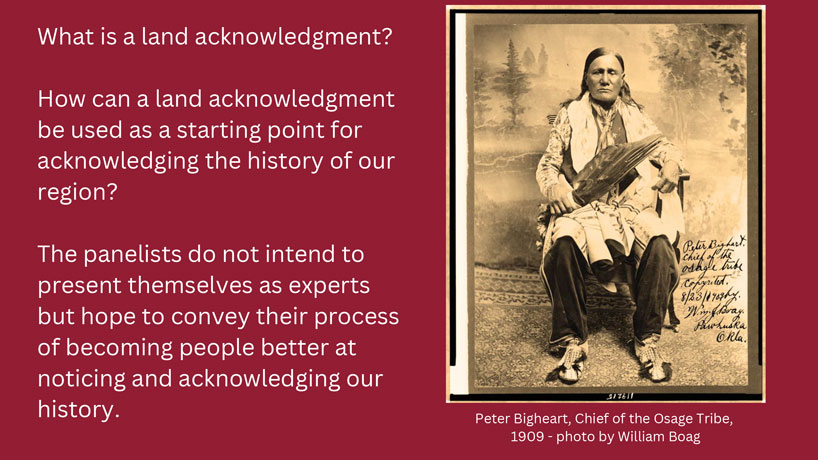
As noted in a flyer for the event, the Anti-Racist Educators Group aimed for the discussion about land acknowledgments to be just a starting point for a larger conversation. (Image courtesy of the Center for Teaching and Learning)
As University of Missouri–St. Louis students, faculty and staff settled in for a virtual discussion last week, a slide asking participants what brought them to the event flashed on screen. “Interest in Land Acknowledgment” read one answer. “I am looking to engage with like-minded folks and to learn more about how to promote equity and awareness to Indigenous social issues” read another. Although the dozen or so answers each varied slightly, one thread ran through them all: a desire to learn.
For Erin Whitteck, an assistant teaching professor of chemistry and biochemistry and assistant director of the Center for Teaching and Learning, that was precisely the goal.
On Nov. 3, Whitteck and the Center for Teaching and Learning facilitated a Zoom discussion for UMSL faculty, staff and students on “Building a Culture of Acknowledgment at UMSL.” In honor of Native American Heritage Month, the session aimed to explore two questions: “What is a land acknowledgment?” and “How can a land acknowledgment be used as a starting point for acknowledging the history of our region?”
According to the Kathryn M. Buder Center for American Indian Studies at Washington University in St. Louis, land acknowledgements “honor a place’s Indigenous people – past and present – and recognize the history that brought us to where we are today. They are meant to recognize how we have inadvertently benefited from the history of colonization, removal, and genocide of Indigenous people.”
UMSL’s virtual panel discussion on the topic was hosted by the Anti-Racist Educators Group, an interdisciplinary group of faculty and staff that’s facilitated by the Center for Teaching and Learning. Initially formed in the wake of George Floyd’s murder in the summer of 2020, the group has continuously been in dialogue about the university’s context in St. Louis and how it relates to teaching and learning. The group’s ultimate goal is to “brainstorm antiracist pedagogical strategies and think about how to apply this knowledge to our courses and activities.”
“We’ve been meeting and learning together for the past two and a half years now and we’ve created a pretty strong community,” said Whitteck. “We’ve been kind of working our way backwards in our history; we looked at St. Louis history in our context.”
With the help of member Dana Klar, an associate teaching professor in the Child Advocacy Studies program and a member of the United Houma Nation, one such topic the group has begun exploring is land acknowledgments. Neither UMSL nor the University of Missouri System currently have land acknowledgments in place, which inspired the group to not just dive into the issue themselves, but to open up the conversation to others around campus.
“We’ve been thinking about and learning about the land we sit on here at UMSL,” Whitteck said. “There’s a lot of complexity about land acknowledgements, so we just wanted to open up the conversation that much more and hear about the conversations that other people are having around campus – I know we’re not the only ones having those conversations. It’s kind of a starting point for a conversation about acknowledging our history and our context and not ignoring what has gone on in the region. How we build that culture of acknowledgement in all different spaces – in our institution and beyond – and how that context impacts students, faculty and staff, how we teach and how we build some of these ideas into our courses.”
As Whitteck stressed to the group at the top of the session, the panel was intended to be the beginning of that conversation – not the end. The goal, then, wasn’t to leave the event with a land acknowledgment written but to begin building a culture of acknowledgment on campus. Along with Klar, panelists included Paul Van Wert, an assistant teaching professor in accounting, and Aimee Dunlap, an associate professor in biology, all of whom were quick to stress that they are not experts on the topic, but merely interested in sharing their own learning processes.
Klar opened the conversation with her thoughts on how land acknowledgements can be meaningful versus merely performative, acknowledging that the latter concern has led to the group discussing the issue for nearly two years now without clear action.
“In my opinion, land acknowledgments are performative and only words if there’s not real meaning behind them – a real commitment, a real relationship, some ongoing commitment to truly recognize and serve and be in community with those people who are the original ancestors, the original caretakers of the land,” Klar said.
Throughout the hour, the conversation stretched across different corners of the topic, including discussions on how land acknowledgments connect to professional practice, expectations for land-grant institutions, faux pas in existing land acknowledgments, ideas for how institutions can support this work and suggested books and movies for those interested in diving further into the topic. Guests were encouraged to “sit in curiosity” and ask questions in the chat, with the hope that they would spark future conversation for an upcoming in-person event scheduled for 12:30 to 1:30 p.m. on Dec. 1.
“This is something that the university as a whole needs to take on and develop really intentionally so that everybody is involved in the process, and that’s what we’re going to focus on,” Whitteck said. “This is a process, not a product. I don’t want my voice or even the voices of just the panelists to be the only ones that are heard. We want to start a conversation with everybody in the community.”
More information and resources from the event are available here.














